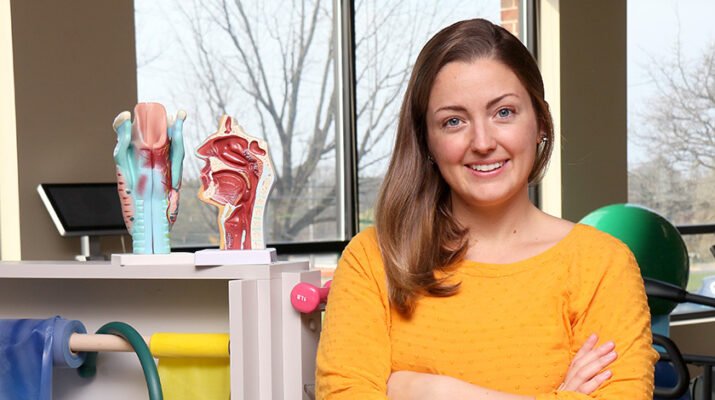Annual mean wage of speech language pathologists in CNY is $80,330
By Deborah Jeanne Sergeant
Speech language pathologists do far more than teach preschoolers how to say the letter “r.”
They assist with all sorts of health issues and work in many different settings with patients across the lifespan.
Regardless of where and with whom they work, speech language pathologists help patients.
That is what drew Dana Donovan, speech language pathologist with Oswego Health, to the profession.
“I knew I wanted to go somewhere in medicine,” she said.
Through high school, she volunteered in a hospital and noted that some patients received only honey-thick liquids. At the time, she did not know that was because the patients experienced swallowing difficulties. That is just one of the areas that some speech language pathologists treat.
Eventually, Donovan learned about speech language pathology and decided that was for her. She addresses disorders of feeding and swallowing, speech and cognitive linguistics, both inpatient and outpatient.
“I treat singers for voice therapy after getting nodules on their vocal chords,” she added. “I see some stuttering cases. We do a lot in the day.”
After completing her master’s in speech language pathology, she completed her residency and clinical fellowship and then passed her clinical exam to receive her state license.
Some bridge programs allow students with a high enough GPA to complete their academic program in five years instead of six.
Beyond the education, Donovan believes that speech language pathologists need flexibility and compassion. “We treat—unfortunately—very sick people.”
Since she sees so many different types of patients in her healthcare setting, remaining mentally agile helps her perform her work well.
“You have to be good with thinking on your feet and making things up quickly,” she said. “We like the variety and thrive on the daily changes. I enjoy the collaboration. You can talk with a doctor or dietitian or ear-nose-throat specialist. I appreciate that.”
She encourages anyone interested in the field to observe at a school, skilled nursing facility or hospital to get an idea about what the work entails.
Nicole Caballero, speech language pathologists with the communications sciences and disorders department at SU, also said that speech language pathologists “definitely have a broad scope.”
Those who want to specialize in a specific area can earn a Ph.D. Many programs now offer a clinical doctorate, for example, for treating patients in a medical setting. Speech language pathologists also complete continuing education credits periodically to maintain their licensure and they can pursue those credits in an area of specialty that interests them.
“A lot of speech pathologists are good talkers, but you have to also be a good listener,” Caballero said. “You have to be adaptable. We have multiple treatments for these disorders. We need to make these therapies individualized for each client.”
She became interested in the field while working in college at a school for children with autism. Many had difficulty with communication.
Caballero enjoys celebrating clients’ small victories with them as they progress toward their goals. She encourages anyone interested in the field to shadow a speech language pathologist.
“While our broad scope of practice may be intimidating, it provides you as a pro with a great variety to challenge yourself with new things and you learn a lot about a great variety of people,” she added. “If you feel stuck in your career, you can make a change of setting. You won’t be stuck doing the same exact thing for 40 years.”
The annual mean wage of speech language pathologists in Syracuse is $80,330, according to the US Bureau of Labor Statistics.

